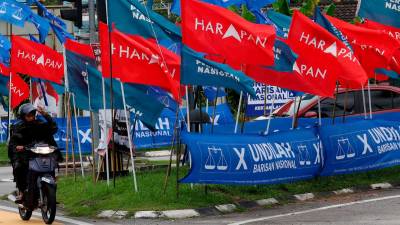PETALING JAYA: Although Pakatan Harapan (PH) has agreed with Barisan Nasional (BN) to avoid contesting against each other in the upcoming 17th Sabah state election, it has yet to reveal who it will back as the next chief minister.
Sabah PKR chief Datuk Mustapha Sakmud said negotiations between PH and BN had been concluded, but talks with Gabungan Rakyat Sabah (GRS) – a coalition of eight Sabah-based parties – were ongoing.
He explained that the negotiations were aimed at preventing electoral clashes among “allied” coalitions – PH, BN and GRS – in the state election, with the current assembly set to dissolve automatically in November.
Mustapha said whichever party secured the majority of seats in the election would be entitled to the chief minister’s post.
“The question of who holds power will, of course, ultimately depend on who commands the majority of seats in the state assembly. According to the state constitution, it does not matter which party it is, the one that commands majority support will be presented to the palace to be appointed as chief minister.
“So for now, each party may have its own candidate, but in the end it comes down to the constitution. Whoever secures majority support will be the one put forward to the palace as the chief minister,” he told theSun in Parliament on Wednesday.
Despite an agreement at the federal level, with PH chairman Datuk Seri Anwar Ibrahim and BN chairman Datuk Seri Dr Ahmad Zahid Hamidi both stating that PH and BN would form an electoral pact with GRS to avoid clashes across the 73 state seats, it is widely known that Sabah BN and GRS are not on good terms.
Sabah BN, led by Datuk Bung Moktar Radin – who is also touted as its candidate for chief minister – is a known rival of GRS chief Datuk Seri Hajiji Noor, who currently holds the post.
It was reported that Bung is seeking for BN to contest 38 to 40 seats, with the remainder allocated to PH.
Meanwhile, opposition party Parti Warisan, led by former chief minister Datuk Seri Shafie Apdal, has confirmed its intention to contest all 73 state assembly seats.
At present, GRS controls 41 seats, PH holds seven, Umno has nine, Warisan has 14, while other parties account for two seats.
Mustapha added that the public is closely observing whether the PH-BN formula in Sabah will succeed as there is strong potential for it to serve as a model for other state elections leading up to the 16th general election (GE16).
“People are now viewing the Sabah electorate as a benchmark for this formula. After this, we will have state elections in Malacca, then Sarawak, followed by Johor and finally GE16. If we do not handle Sabah properly, it could create cracks within the unity government.
“If those cracks widen, they could seriously dim our chances of winning a second term at the federal level,” he said.
Mustapha said PKR would act as mediator to help reconcile differences among coalition partners at both state and federal levels.
